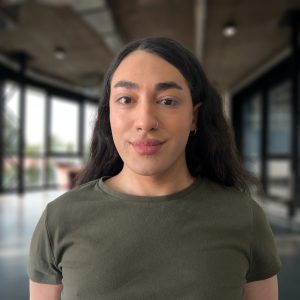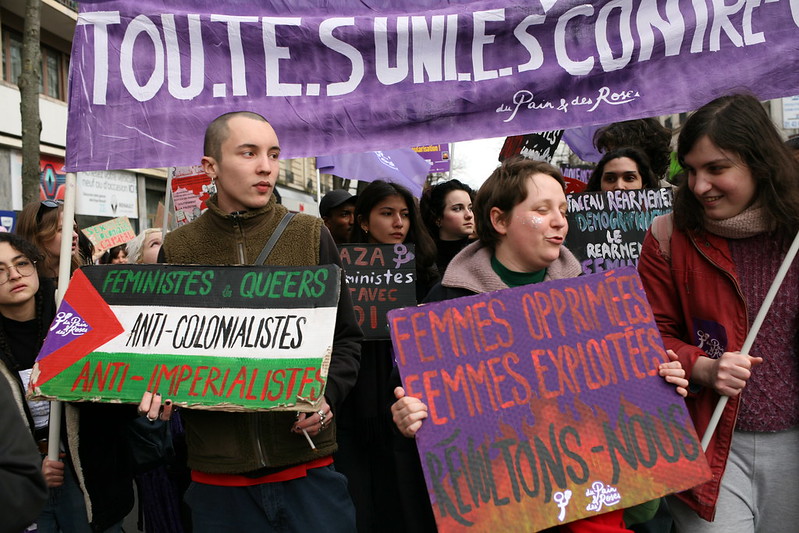
The Muslim community and LGBT community are not separate; we mourn together. I am Muslim, I am queer and I exist.
–Sonj Basha, speaker at a vigil in Seattle following the Pulse nightclub shooting in 2016
This [queer Palestinian protest in Haifa in 2019] is the first-ever protest of the queer Palestinian movement, based on the principles of an intersectional struggle between queer-Palestinian struggles and struggles against the occupation… The protest represents a voice calling for liberation without restraints—not of the occupiers, and not of the patriarchy. It’s important to show support for all LGBT Palestinians.
–Rula Khalaileh, organizer with the Palestinian “Women Against Violence” organization
We were a part of the mainstream society before the British criminalised our existence through laws such as the Criminal Tribes Act of 1871. Transphobia is a colonial legacy… We will continue our struggle. We aim to raise our voice for our rights so loudly that it reaches those in power and echoes in the chambers of the parliament.
–Hina Baloch, political convener and organizer of the Sindh Moorat march in Pakistan in 2022
There’s nothing new about being trans. Only, we didn’t have the language for it back then… Even here in Kenya, in previous generations they had gay men. They introduced those laws against homosexuality which indicates that it happened, because you can’t put laws on something that’s not existing or unknown… God knows where it comes from. So, whenever I’m preaching the gospel in our community, I tell them to look up to the Lord; he knows why you were created that way; when you get to know yourself, you will get peace.
–Keeya, gay Christian pastor and Ugandan refugee interviewed in 2019 for Adriaan van Klinken and Johanna Stiebert’s Sacred Queer Stories
Dominant discourses globally assert that queerness and transness are White/western impositions in Asia, Africa, and the Americas. They tell us that queer Muslim and Palestinian positionalities are impossible. The stories shared by the activists and ministers quoted above—along with scholarship from queer of color critique and decolonial and postcolonial studies—show these discourses to be a lie. They also challenge the notion that queerness and transness are White/western impositions in Asia, Africa, and the Americas. These stories participate in traditions of critical queer, decolonial, anti-racist, and feminist thought that examine questions of gender and sexuality by considering the relationship among racialization, coloniality, and heteronormativity.
Heteronormativity involves the idealizing and societal privileging of a strict gender binary, “opposite sex” romantic and sexual desires, heterosexual marriages, and the raising of children in nuclear families. It results in cisgender-heterosexual existence occupying default representational and socio-politico-economic spaces in many contexts, and in doing so, upholds compulsory heterosexuality. The term “compulsory heterosexuality” first appeared in lesbian feminist theorist Adrienne Rich’s 1980 essay “Compulsory Heterosexuality and Lesbian Existence,” where it was used to critique the societal forces that push women into heterosexual marriages and constrain them from imagining or pursuing life paths centered around relationships (romantic/sexual or otherwise) with other women.
Expanding upon this foundational work, queer feminist theorist Sara Ahmed writes that compulsory heterosexuality—which she (re)defines as the societal assumption and enforcement of heterosexuality which is “the accumulative effect of the repetition of the narrative of heterosexuality as an ideal coupling” (423)—shapes the ways that bodies orient themselves in space. Repetitions of the heterosexual couple form through music, advertising, wedding traditions, and other cultural productions cause a “heterosexualization” of public spaces. This heterosexualization naturalizes and idealizes heteronormative existence, framing men and women as “opposites” and reinforcing “opposite sex”-oriented desires and life paths. Heteronormativity, then, is sustained through the visible repetition and intergenerational transmission of norms and ways of living that are marked as legitimate. Heteronormative standards of legitimacy reinforce compulsory heterosexuality by associating heterosexual couplings with life, culture, civilization, and the reproduction of familial lineage while marking queerness (divergence from these prescribed pathways involving binary gender norms, desire for one’s “opposite sex,” and participation in familial reproduction) as a failure. While many heterosexual subjects experience comfort and ease “in line” with the desires promoted by a heteronormative society, subjects who fail to “orient” themselves towards idealized sexual objects and accepted life paths are read as queer threats to the social order.
Decolonial feminist scholar María Lugones argues that the heterosexualist patriarchy and the binary, hierarchical, and heteronormative conception of gender upon which it rests are rooted in colonialism. Lugones’s framework draws heavily from decolonial theorist Aníbal Quijano’s understanding of the coloniality of power, which accounts for “modernity” by focusing on the new modes of social classification and domination that emerged as European colonialism expanded and Eurocentered global capitalism developed. Quijano uses the term modernity/ coloniality to emphasize that modernity cannot be thought apart from coloniality or from the hierarchical categories of “race” and notions of “rationality/irrationality” that have provided its structure. By focusing on issues of gender and sexuality, Lugones builds upon Quijano’s work regarding colonialism, capitalism, and racialization and critiques what she calls the colonial/modern gender system. Under this system, White bourgeois men and women have been ordered through biological dimorphism (the idea of “biological sex” as stable, binary, and innate), heterosexualism, and patriarchy, while persons on “the dark side” of the colonial divide have suffered labor exploitation, sexual violence, and dehumanization. Jamaican writer and theorist Sylvia Wynter similarly emphasizes this colonial divide in her decolonial analysis of western colonialism, racialization, and gender categorization: “At the beginning of the modern world, the only women were white and Western. … you had true women on one side, the women of the settler population [in the Caribbean and the Americas], and on the other you had Indianwomen and Negrowomen.” Wynter argues that “from the very origin of the modern world, of the western world system, there were never simply ‘men’ and ‘women’” (174) but that western colonial expansion resulted in the intertwined production of hierarchical categories of race and gender with European Christian/post-Christian “Man” in a position of dominance and superiority.
The colonial/modern gender system presents its ordering of human relations as natural and immutable, and one must go outside of it in order to examine that which it has rendered invisible and unimaginable. Turning to the decolonial scholarship of Oyéronké Oyewumí and Paula Gunn Allen, Lugones writes that many societies recognized intersex and third gender individuals before colonization, that binary/hierarchical gender was used as a western tool of domination over Yoruba societies, and that colonizers attacked gynocracies that had existed within certain Indigenous North American societies. Gender itself is a colonial imposition, she argues, but one might develop decolonial feminism by attending to those “who resist the coloniality of gender from the ‘colonial difference’” (746). In other words, just as “modernity” cannot be thought apart from “coloniality,” “coloniality” cannot be thought apart from the hierarchical categories of “race” and “gender” that developed to justify and maintain structures of Eurocentered power. As writers, artists, and activists examining the intertwined histories of colonialism and heteronormativity have emphasized, however, attention to historical and ongoing modes of thinking about gender and sex which resist and/or go beyond the constraints of the colonial/modern gender system can provide a means of honoring Indigenous knowledges, finding a present-day sense of belonging, and healing from traumas rooted in colonial oppression.
When analyzing and challenging the colonial/modern gender system, however, it is important to avoid reductively aligning heteronormative identities with coloniality and LGBTQ+ identities with decoloniality or anti-oppressive politics. For instance, in her scholarship on homonationalism and pinkwashing, queer theorist Jasbir Puar has discussed the ways that nationalistic liberal politics tenuously incorporate certain queer subjects while constructing Orientalized terrorist others. That is, nations such as the United States have advanced imperialistic agendas and justified international military aggression by contrasting their presumably exceptional inclusion of LGBTQ+ subjects against “Muslim homophobia.” Additionally, Cathy J. Cohen’s work of queer of color critique has challenged both assimilationist LGBTQ+ politics that seek incorporation into dominant societal structures and radical queer politics that assume an overly-simplistic heterosexual/queer binary. By attending intersectionally to race, gender, and class, Cohen writes that not all “heterosexual” subjects benefit equally from heteronormativity (for instance, she notes that women of color who are on welfare “fit into the category of heterosexual but [their] sexual choices are not perceived as normal, moral, or worthy of state support” [26]) and calls for more nuanced and expansive forms of queer analysis that can challenge structures of marginalization and domination.
This educational module attends to questions of coloniality and decoloniality in its exploration of how queerness and gender are navigated across religious, political, and geographic contexts. The essays gathered for this module offer an array of perspectives from Contending Modernities authors and have been grouped into three overarching themes: (1) gender, religion, and politics; (2) heteronormativity, religion, and politics; and (3) decolonial perspectives on gender, sexuality, and religion. These essays analyze the ways that various forms of nationalistic and religious discourses have promoted and reinforced particular norms for gender and sexuality, as well as the ways that non-normative configurations of gender and sexuality have offered means of resisting nationalism and coloniality. The essays provide intersectional approaches that affirm the existence and validity of worlds that resist the colonial/modern gender system’s dictates around gender and sexuality.
Theme 1: Gender, Religion, and Politics
The essays gathered under this theme address the constructed-ness of gender and highlight the ways that women from various religious and political contexts have mobilized to critique religious nationalism, patriarchy, colonialist stereotypes, and state violence. Julia Kowalski’s essay discusses how Muslim women protestors have invoked the language of family and home to counter patriarchal Hindu nationalism in India. Saadia Yacoob’s piece reflects critically and constructively on the role of gender in the classical Islamic ethical tradition and makes proposals for Muslim feminist ethics. Brenna Moore’s post critiques the antifeminist and antigay activism of the global Roman Catholic right and turns to the example of twentieth-century Catholic theologians who resist the right’s theology as a resource for combatting oppression in the present. Lastly, Laura S. Grillo’s post discusses expressions of “female genital power” in West African traditions that push back against “masculinized modernity” and confront the violence of postcolonial nation-states. Together, these essays offer perspectives grounded in a variety of religious traditions, political issues, and geographies. They reveal the constructedness of gender by showing how ideas about gender (and womanhood, in particular) are advanced differently across contexts, as well as the diverse ways that possibilities for resistance and contestation take shape.
Remaking Indian Secularism: The Fearless Grannies (Dadis) of Shaheen Bagh
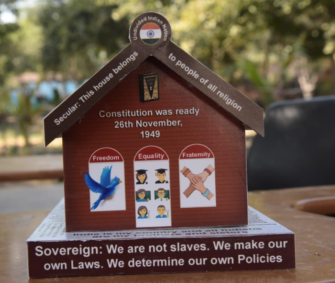
Julia Kowalski argues that the protests that have taken place in the Shaheen Bagh neighborhood of Delhi are not only displays of resistance against the combined effects of the Citizenship Amendment Act (CAA) and the National Register of Citizens (NRC), but also acts of subversion that challenge stereotypes held by the ruling party in India about Islam, gender, and the family. (For more information about the CAA and NRC, see this post by Susan Ostermann.) As Kowalski notes, many protesters were middle-class, middle-aged-or-older “housewives” who wore hijab. She argues that the protests “are innovative not because of the gendered identity of the protesters, but because of how protesters have mobilized that identity to contest powerful scripts of citizenship, religion, family, and nation.” Muslim women protesters deploy representations of female kinship and home in order to promote a secular, inclusive democracy and to invoke a new language of national belonging—one that does not rely upon “documentary evidence of property ownership and descent from male kin.” In doing so, these women subvert narratives of Muslim women’s oppression by Muslim men (an Islamophobic discourse that has justified British “civilizing” missions in India and continues to justify western imperialism) and narratives of Muslim non-belonging in a presumably “Hindu” nation.
Kowalski’s focus on Muslim women protesters illuminates the ways that invocations of female kinship have provided a means of contesting religious nationalism and patriarchy—specifically, right-wing Hindu nationalism—in India. As deployed by these protesters, the language of family and home troubles the boundaries of public and private/domestic while subverting sexist and Islamophobic representations of Muslim women.
Hierarchy, Interdependence, and Islamic Ethics
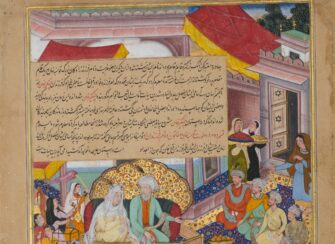
This post by Saadia Yacoob is part of a book symposium on Zahra Ayubi’s Gendered Morality: Classical Islamic Ethics of the Self, Family, and Society, which critically engages texts from the classical Islamic ethical tradition and offers constructive proposals for the building of a feminist Islamic ethics. (For a more detailed summary of the book, refer to this introduction to the book symposium.) Considering the applicability of Islamic ethical discourses to women, Yacoob notes that gendered divisions of household labor (which impact both Muslim and non-Muslim women) hinder Muslim women from being able to dedicate time to ritual worship and the acquisition of religious knowledge. Responses by religious scholars that assure women that childcare is itself an act of worship—while perhaps well-intentioned—are not adequate for addressing the exclusion of women (especially mothers) from Islamic ideals of virtuous and ethical living.
Yacoob discusses a tension charted by Ayubi in her examination of texts from the classical Islamic ethical tradition: there is an egalitarian understanding of human creation and the androgynous nafs (soul) that each person possesses, but also an emphasis on “rational capacity in ethical refinement” which “not only gendered the nafs male but also authorized an intellectual hierarchy in which only elite men possessed full rational capacity.” In her response to Ayubi’s work, Yacoob highlights the emphasis on social relationships and interdependence in classical Islamic ethics and suggests that, although one must critique the hierarchical positioning of elite men above women and non-elite men, one might carry the understanding of human interconnectedness forward in feminist ways that promote equality and flourishing. Importantly, both Ayubi and Yacoob critique patriarchal interpretations from classical Islamic ethical discourse while avoiding rejecting the tradition entirely; rather, both scholars imagine possibilities of critically “thinking with this discourse to develop a Muslim feminist ethic that centers the flourishing of all humans.”
Taking it Back from the Global Catholic Right: Reclaiming the Underworld of the Religious Imagination
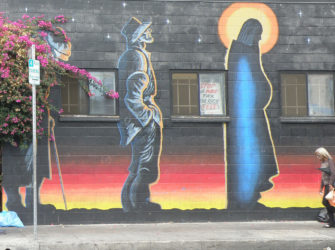
In this post, Brenna Moore discusses the role of Roman Catholicism in right-wing populist movements around the world and points to resources from the Catholic theological tradition that might aid in the development of a resistant, compassionate, leftist social politics. First, Moore writes that although right-wing populism might appear to draw upon a Christian logic of inversion (in which God chooses those who are lowly and reviled, not those in established positions of worldly power), figures who appeal to right-wing populist Catholics—such as Trump—violate this logic of inversion by using an “antiestablishment mockery of the elites” to in fact “[mock] the vulnerable,” including disabled people, Muslims, and women. Turning to an example from another context, Moore notes that right-wing Catholic populists in France tend to protest against gay marriage and liberal gender norms by framing them as an American invasion: “This keeps the antifeminist and antigay activism still seemingly tethered to a respectable anti-elitism and anti-hegemony.”
In response to these false logics of inversion, Moore offers several examples of resistant Catholic theologians of twentieth-century France to show how the insights they’ve contributed might act as resources in undoing the “repulsion that so many white Catholics feel toward Muslim refugees, gay families, the poor, African Americans, and women who control their reproductive lives” and advancing concrete goals such as childcare, access to contraception, combating poverty, and protecting those who are marginalized. Moore demonstrates that the antifeminist and antigay activism of the Catholic right, which draws upon heteronormative notions of gender and sexuality, can be countered by connecting with liberative theological resources from the Catholic tradition.
Evading Masculinized Modernity
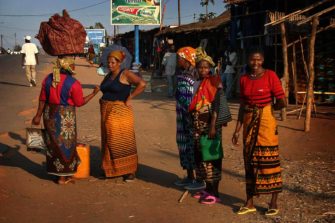
This post by Laura S. Grillo is part of a book symposium on Faith in Flux, in which Devaka Premawardhana examines practices of religious conversion among the rural Makhuwa people of northern Mozambique. (For a more detailed summary of the book, refer to this introduction to the book symposium.) In this post, Grillo compares the matricentric mobility, flexibility, and pluralistic disposition of the Makhuwa with her own work on the performance of female genital power in West African traditions. Grillo argues that, although valuable, Faith in Flux does not sufficiently consider Makhuwa matricentricity; therefore, the book fails to “convincingly portray a fluid retention or cyclical movement of return to the “‘Mother’ religions’ that Premawardhana suggests are the essence of local ontology.” Through her critiques, Grillo pushes Premawardhana to question the gendered assumptions of the conceptual apparatus he employs to theorize Makhuwa practices, which seem to centralize male religious culture and “reinforce[] the stereotype of women’s natural profaneness.” Grillo proposes a focus on the ways that various Indigenous African rituals, performances, and matricentric conceptions of gender offer means of resisting postcolonial state violence and policies that reinforce the “external pressures of masculinizing modernity.”
Theme 2: Heteronormativity, Religion, and Politics
The posts included within this theme focus on the salience of heteronormativity, homophobia, and transphobia in contemporary politics and explore the ways that religious notions of gender and sexuality shape such politics. Jason Springs’s essay examines the conservative sexual politics of White evangelical ethnoreligious nationalists in the United States and discusses the interconnected histories of twentieth-century anti-miscegenation laws and present-day heteronormative ideologies. Michael Vicente Pérez’s essay considers the roles of homophobia and Islamophobia in societal responses to the 2016 Pulse nightclub massacre and critiques homonationalist framings of the United States that construct Muslims as especially homophobic threats. The essay by Halah Abdelhadi focuses on the growing movement for LGBTQ+ rights in Palestine and argues that there is a need for “a mediating lexicon” that engages religious discourses to combat homophobic violence and the exclusion of queer Palestinians from religious modes of belonging. Ali Altaf Mian’s essay reveals the ways that heteronormative ideologies—particularly the assumption of a gender binary between men and women—reinforce transphobia and have hindered efforts by Muslim leaders to combat discrimination against transgender people in Pakistan. Together, these essays point to the ways that heteronormative ideologies shape religious nationalism and reinforce homophobic and transphobic violence. The essays also advance possibilities for solidarity, allyship, and religious engagement that push back against heteronormativity and its varied interconnections with racism, militarism, and Islamophobia.
The Sexual Politics of Ethno-Religious Nationalism

In the blog series “Zombie Nationalism: Apocalypse, Race, and the Sexual Politics of White Evangelical Christian Nationalism,” Jason Springs introduces the concept of “zombie nationalism” in his analysis of White evangelical political and religious ideology in the United States. This concept describes a persistently recurring and reanimating dynamic, pattern, and logic that explains “the socio-political processes by which White evangelical ethno-religious nationalism has asserted and reasserted itself across recent decades.” Springs contends that this phenomenon is driven not only by religion (modern evangelical theology) and race (as manifested through White ethno-religious nationalism) but also by conservative sexual politics. Springs clarifies that “sexual politics” refers to “the ways that gender norms, operations of power related to sexual identities, and policing of sexuality all function to legitimate and perpetuate ideologies, and are used to advance political agendas.” He argues that it is crucial to attend to the ways that heteronormative ideologies of gender and sexuality both motivate and are reinforced by White evangelical ethno-religious nationalism.
In this post from the series, Jason Springs contends that White Christian evangelicals’ current justification of their opposition to same-sex marriage relies on an extension of the same logic that they had once used to support anti-miscegenation laws. Thus, White evangelical support for Trump is not an isolated reaction against marriage equality, but participates in a longer history of White evangelical sexual politics centered around the so-called “sanctity of marriage.” Here, White Christian nationalism relies upon the upholding of a rigid, heteronormative gender binary in ways rooted in particular notions of Whiteness, Christian theology, and western civilization.
Fear and Mourning in the Shadow of Orlando
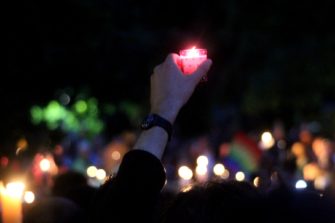
Michael Vicente Pérez’s essay discusses Islamophobia, homophobia, and the cultural politics of fear in the wake of the 2016 mass killing at the Pulse nightclub in Orlando, Florida. Drawing from work by Sara Ahmed and Jasbir Puar, Pérez analyzes the mobilization of an affective politics of fear-as-threat (that is, fear as “an affective link experienced as threats to some group from some group”) in the production of the Muslim as threatening Other following the Orlando massacre. This politics of fear serves to construct LGBTQ+ inclusion as an essential part of American identity—despite the persistence of anti-LGBTQ+ violence in America—and produce Muslim difference in terms of terrorism and hatred. As Pérez further explains, “the narrative incorporation of Orlando’s victims [into the American national body] resignified the murder as an act of terrorism in which the violence of Muslim sexual intolerance not only underscored the moral superiority of America but also proved the necessity of American empire.” In contrast, turning to Sonj Basha’s affirmation of (her own and others’) queer Muslim existence in her speech at a widely attended Seattle vigil following the massacre, Pérez writes that shared grief and mourning can momentarily disrupt the affective unities/divisions created by fear and gesture to “the possibility of a ‘we’ that refuses the politics of fear.”
Whereas Jason Springs’s essay focused on the ways that White evangelical ethno-religious nationalism reinforces and is dependent upon a heteronormative notion of the “sanctity of marriage,” Pérez’s essay alternatively examines the ways that homonationalist framings of the United States as an exceptionally inclusive haven for LGBTQ+ people serve to uphold U.S. militarism and imperialism and reductive, Islamophobic constructions of Muslim people. Thus, while sexual politics in the United States frequently draw upon notions of a gender binary and idealize heteronormative relationships between men and women, Jasbir Puar’s theorization of homonationalism shows that ideas of LGBTQ+ inclusion have also been mobilized towards ethno-religious nationalist ends.
They Say “Out of Sight, Out of Mind,” Look, We Are All over Palestine
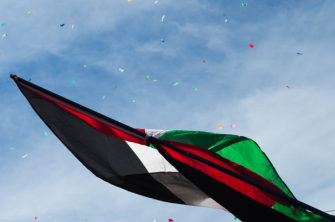
This piece by Halah Abdelhadi reflects on the movement for LGBTQ+ rights in Palestine. Abdelhadi contextualizes the increased visibility of LGBTQ+ issues among Palestinian citizens of Israel—which have become one of the most controversial political topics in Palestinian society—by discussing the first queer Palestinian protest that occurred in 2019 in response to an act of homophobic violence. She contends that there are three primary positions on LGBTQ+ rights in Palestinian society: pro-queer (held mainly by activists), neutral (held by self-identified “secular progressives”), and antagonistic (the position of those who weaponize religion to justify homophobic violence). Overcoming the homophobia of the antagonistic position, she claims, requires novel interpretations of religious meaning. Given the increased visibility of the queer Palestinian community, Abdelhadi identifies a need for inclusion, the use of precise (rather than vague or neutral) language to denounce homophobic violence, and the building of “a mediating lexicon” that allows for conversations with spiritual and religious leaders to challenge the ways that queer Palestinians have been “alienated from their national and religious modes of belonging to Palestinian society.”
Fighting Transphobia: Analyzing the Pakistani Fatwa on Transgender Marriage
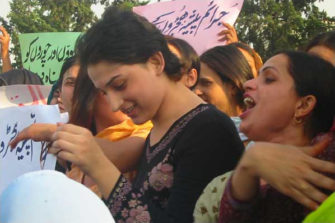
In this piece, Ali Altaf Mian discusses a 2016 endorsement of a fatwa on transgender marriage which takes important steps towards combating discrimination against transgender people in Pakistan, yet nonetheless operates based on heteronormative assumptions. The fatwa, which was endorsed in a statement crafted by the Pakistani clerics of Tanzim-I Ittihad-i Ummat and signed by about fifty other local Muslim jurists and theologians, argued that Islamic law should be interpreted as extending marriage and other rights to transgender people. Importantly, Mian writes, this fatwa and its endorsement condemned discrimination in places of “the home, the street, the graveyard, and the brothel—where members of the hijra [transgender] community viscerally experience the brunt of a hyper-masculinist and heteronormative social order.”
At the same time, the logic of heteronormativity that supports transphobia still underlies this fatwa, which employs language such as “unambiguous signs of a single-sex” and “bodily signs of both sexes” when describing the bodies for whom certain rights do or do not apply. As Mian reveals, the fatwa continues to impose a gender binary even when acknowledging transgender bodies, and it accords social recognition to trans people in ways dependent on their bodies’ presumed approximation to this gender binary. To truly act as allies in fighting transphobia, he argues, Muslim jurists and theologians should question the ways that culturally constructed notions of maleness and femaleness shape ideas about biology, law, and ethics; study the complexity of human bodies by “cultivating a flexible and creative mode of engagement with local knowledge traditions where [they] will encounter both reifications and disruptions of the gender binary”; and from those encounters, discern when to retain, reconfigure, or renounce traditions “in order to make sense of and to appreciate shifting embodiments of sex, gender, and sexuality in the contemporary world.”
Theme 3: Decolonial Perspectives on Gender, Sexuality, and Religion
This final theme focuses explicitly on the role of colonialism in shaping gender and sexual norms and on efforts to decolonize discourses around gender, sexuality, and religion. The essay by Sa’ed Atshan engages with Adriaan van Klinken’s Kenyan, Christian, Queer and scholarship on other contexts shaped by colonial legacies in order to advance proposals for decolonizing queer studies and addressing Christianity’s relationship to colonialism and sexuality. Ebenezer Obadare also engages van Klinken’s text but emphasizes that the existence of homophobia in Africa cannot be reduced to a colonial or Christian product and argues that van Klinken’s perception of the condition of being queer in Africa is overly optimistic. Ludovic Lado’s essay turns to the construction of gender employed by the state in Côte d’Ivoire in its efforts to combat gender-based inequality and discrimination and shows that the state’s assumption of a male/female binary hinders it from recognizing and addressing violence against the LGBTQ community. Nisa Goksel focuses on resistant movements of Kurdish women in Türkiye and Syria, who—in ways that depart from stereotypical representations of Middle Eastern women—seek a non-colonial modernity. Lastly, Jacqueline Hidalgo discusses the name change of MEChA (Movimiento Estudiantil Chicanx de Aztlán, a U.S. Latine student-led organization) which removed the terms “Chicanx” and “Aztlán,” noting the long histories of contestation within the Chicano movement, particularly around issues of gender, sexuality, race and indigeneity, and decoloniality. Together, these essays provide an explicit engagement with the interconnections among colonialism, religion, gender, and sexuality and offer examples of decolonial theories and movements that have contended with these interconnections across contexts.
On Decolonizing Queer Studies
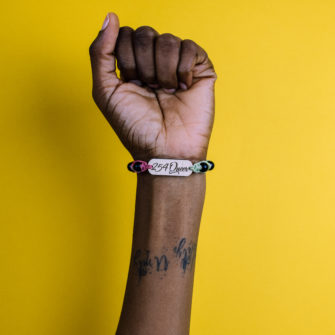
This essay is a part of a book symposium on Adriaan van Klinken’s Kenyan, Christian, Queer: Religion, LGBT Activism, and Arts of Resistance in Africa, which engages works of art and activism to explore the ways that various LGBTQ+ Christians in Kenya reimagine their identities, faith, and lives. (For a more detailed summary of the book, refer to this introduction to the book symposium.) In his essay, Sa’ed Atshan draws on van Klinken’s monograph to think more broadly about what it means to decolonize queer studies. He does so by first comparing and contrasting van Klinken’s work with George Paul Meiu’s recent work on Kenyan sex workers in Ethno-erotic Economies. Both authors address connections between colonialism and religion in Kenya, and both engage the connections between colonialism and sexuality—with van Klinken’s work registering the cognizance “of British colonial homophobia that significantly departed from indigenous Kenyan queer tolerant attitudes.” Whereas van Klinken primarily focuses on queer-identified, middle-class, urban subjects who “can forge solidarity with their queer counterparts in the west,” however, Meiu offers a more in-depth analysis of ethnic categorization and class, as well as a broader conceptualization of queerness that explores the ways that rural, poorer, heterosexual subjects “are mired in racialized/otherized/fetishized relationships with western tourists.”
Next, Atshan reflects on his own work on queerness in Palestine, drawing attention to the importance of engaging multiple colonial and postcolonial venues. He proposes that the decolonization of queer studies be advanced through attention to South-South epistemologies and solidarities. For instance, analytical vantage points from Kenyan contexts might be brought into dialogue with the contexts of other places formerly colonized by the British Empire, such as Palestine, India, and Pakistan. Atshan notes that queer Palestinian Christians, like queer Christians in Kenya, face legacies of British colonial homophobia, and can experience Christianity as both a source of imperial violence and anti-imperial empowerment.
Love Bites
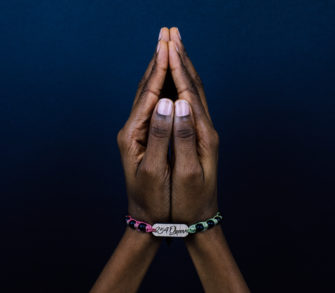
This piece is also part of a book symposium on Adriaan van Klinken’s Kenyan, Christian, Queer. Ebenezer Obadare writes that van Klinken challenges simplistic narratives of “African homophobia” and of the African continent “lagging behind” the rest of the world (especially the United States) in matters related to gender and sexuality. On the other hand, Obadare emphasizes that Africa should not be imagined as having had complete sexual tolerance prior to European colonization and the influence of American conservative Christianity; rather, homophobia in the continent is “propelled by a wide range of local and external cultural, social, and political forces.”
Obadare highlights the novelty of van Klinken’s emphasis on the positive role of Christianity in the lives of Kenyan queer people; however, he notes that he does not fully share van Klinken’s optimism about the condition of being queer in Africa. He links this skepticism in part to his experience as a Nigerian who has witnessed the homophobia that exists in his own country. He also critiques van Klinken for not focusing enough attention on the Kenyan state. Overall, Obadare commends van Klinken’s groundbreaking approach to queer life in Kenya, but provides an important reminder that colonialism and Christianity are not the only forces that have operated to reinforce homophobia in Africa.
Côte d’Ivoire’s Working Definition of Gender Empowers and Excludes
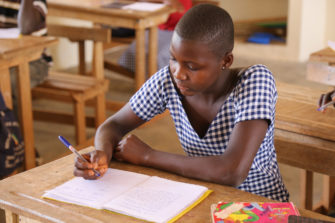
In this essay, Ludovic Lado discusses the uses and limitations of the state construction of gender in Côte d’Ivoire. Lado points to the argument that “in pre-Islamic and pre-Christian Africa, gender differentiation and hierarchies were less rigid and therefore more flexible than those inherited from Islam, Christianity, and colonial legal systems that current gender reforms seek to correct.” He writes that while Africa still has much work to do in combating gender-based injustices, inequalities, and discrimination, many African countries are closing the gender gap faster than western countries.
He writes that although steps have been made to increase women’s literacy rates and empower women economically in Côte d’Ivoire, the framework taken up by Ivorian state gender policy seeks women’s equality with men while failing to consider the LGBTQ community. According to Lado, “heterosexuality remains the norm both institutionally and in collective representation” in Côte d’Ivoire and other African contexts. Regardless of whether or not homosexuality existed (and was met with acceptance) in pre-colonial Africa—a topic that Lado writes is highly debated—LGBTQ Ivorians are marginalized and subjected to violence in the present. In response, Lado suggests that movement away from a male/female binary opposition will allow the Ivorian state construction of gender to acknowledge the specificity of LGBTQ people and address discrimination.
Modernity, Women, and War: Struggles for Peace and Democracy in the Middle East
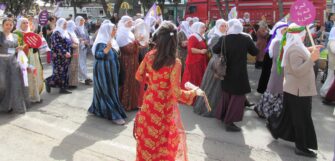
This piece by Nisa Goksel contributes to studies of women and gender in the Middle East by exploring the resistance movements of Kurdish women. Informed by an awareness of the interrelatedness of modernity and colonialism, Goksel’s framework for the topic challenges monolithic representations of women in the Middle East which assume these women to be the “victims of ‘oppressive’ Middle Eastern men; of colonialism; and/or of religious, traditional, and national powers.” Goksel also challenges the perception of Islam as the key determining factor in Middle Eastern women’s lives, particularly the idea that Islam traps these women in a “yet-to-be-modern” patriarchal existence. Adding the role of recent wars in the Middle East to her analysis, Goksel argues that these wars reveal the connections between modernity and colonialism and have been “crucial to the formation of alternative women’s movements and groups as well as to the alternative imaginations of modernity.”
Next, Goksel elaborates on two examples of alternative Kurdish women’s movements: Peace Mothers pursuing an end to the war between the Turkish state and PKK (Partiya Karkerên Kurdistan, or Kurdistan Workers’ Party) guerrillas, and Kurdish women resistance fighters in Syria who seek decolonization and a women’s revolution. Goksel argues that while these alternative women’s movements may appear as opposites within a colonialist gaze (one peaceful, and one that uses weapons), they both have the goal of creating a non-colonial modernity that is truly democratic and peaceful. Thus, both movements challenge particular Orientalized, Islamophobic, and sexist representations of women—as did the Muslim women protestors in India discussed by Julia Kowalski—while also resisting colonialism and its legacies.
Beyond Aztlán: Latina/o/x Students Let Go of Their Mythic Homeland
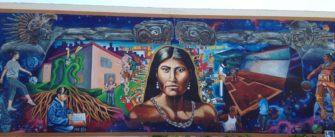
This essay by Jacqueline Hidalgo discusses the 2019 decision of student leaders from MEChA (Movimiento Estudiantil Chicanx de Aztlán) U.S. Latin/o/a/x organizations across the country to remove the terms “Chicanx” and “Aztlán” from the organization’s name, arguing that such a move does not erase history, but rather participates in a long history of contestation over those terms. Hidalgo traces the history of MEChA and writes that in the 1960s when students mobilized to resist dominant modern European thought, terms such as “Chicano” and “Aztlán” allowed ethnically Mexican activists to counter the derogatory names that had been forced upon them, claim an ancestral connection to lands that are now considered part of the United States, and “[invoke] both a pre-Columbian past and a future where colonial sufferings have ended.”
Hidalgo notes that not all ethnically Mexican activists had been in agreement about the use of the terms, however, and identifies several lines of contestation that arose. For instance, the use of “Chicano” and “Aztlán” as decolonial terms is complicated by an awareness that the Aztecs and Indigenous Mexica peoples colonized and oppressed a variety of other Indigenous peoples prior to Spanish colonization, and that 1920s Mexican nationalist appeals to mestizaje (from which these terms emerged) valued “mixture” while “oppos[ing] indigenous rights and eras[ing] Mexicans of Asian and African descent.” Additionally, the 1970s Chicano movement frequently centered cisgender heterosexual mestizo men and patriarchal familial language, creating a need for Chicana feminists to create their own organizations and for LGBTQ activists to construct their own visions of queer Chicano/x/a familia in resistance to machismo.
In 2019, student leaders considered the new acronym MEPA (Movimiento Estudiantil Progressive Action) but ultimately decided to adopt the name Mecha (meaning “fuse”) for the organization rather than continue with an acronym-based approach. They also revised the constitution to intentionally center “Black, Indigenous, Queer, Trans, Non-binary, and Femme people.” Hidalgo writes that students’ contemporary efforts to change the name of their collective echo the drive towards self-determination that motivated MEChA’s founders and create space for the movement to continue and transform with future generations.
Conclusion and Discussion Questions
This educational module has assembled works by Contending Modernities contributors and theorists who analyze gender, sexuality, and politics with attention to religion, race, and modernity/coloniality. The three themes have focused on social constructions of gender and womanhood, heteronormativity and sexual politics, and decolonial approaches to gender, sexuality, and religion. The questions below are designed to provoke continued discussions regarding the relationship of religious discourses, nationalism, and colonialism to gender and sexuality and to invite constructive decolonial responses to the colonial/modern gender system.
-
-
-
Intersections of Religion, Gender, and Sexuality
How does religion impact the negotiation of gender and queerness? How does the interrelationship among religion, gender, and sexuality vary across contexts? What possibilities exist within different religious discourses (e.g., Catholic, evangelical Christian, Hindu, Muslim, and/or African traditional religious discourses) for heteronormative and non-normative expressions of gender and sexuality to be represented, affirmed, naturalized, or reinforced?
-
Nationalism and Queerness
In what ways might nationalism relate to sexual politics? How can nationalism affect questions of gender and sexuality, either by prescribing and reinforcing particular gender and sexual norms or by tenuously incorporating other gender and sexual identities (as in homonationalism)? Alternatively, how might the presence of non-normative configurations of gender and queerness resist or disrupt nationalism?
-
Gender, Colonialism, and the Nation
How might religious nationalism, in particular, draw upon certain configurations of gender and sexuality while disavowing others? How do religious discourses influence the shape that nationalism takes within a particular context, and the ways that particular notions of gender and sexuality are deployed in support of nationalism? How have the histories and ongoing legacies of colonialism—and the impact of colonialism on gender and sexuality—influenced various formations of religious nationalism?
-
Beyond The Module
What concrete examples—from or beyond the posts assembled for this educational module—could illustrate the impact of colonialism and its legacies on discussions around gender and sexuality? How might a decolonized approach to gender, sexuality, and queerness be constructed?
-
Trauma and Collective Healing
Trauma is defined as a physiological and emotional response to an imminently dangerous event. Collective trauma “refers to the psychological reactions to a traumatic event that affect an entire society … collective memory persists beyond the lives of the direct survivors of the events, and is remembered by group members that may be far removed from the traumatic events in time and space.” How could a decolonized approach to gender, sexuality, and queerness be a catalyst for collective trauma healing?
-
-
Bibliography and Further Reading
Ahmed, Sara. “Queer Feelings.” In The Routledge Queer Studies Reader, 422-441. Edited by Donald E. Hall and Annamarie Jagose, with Andrea Bebell and Susan Potter. New York, NY: Routledge, 2013.
Ahmed, Sara. Queer Phenomenology: Orientations, Objects, Others. Durham, NC: Duke University Press, 2006.
Allen, Paula Gunn. The Sacred Hoop: Recovering the Feminine in American Indian Traditions. Boston: Beacon Press, 1986/1992.
Baloch, Shah Meer. “‘We Deserve to Be Treated Equally’: Pakistan’s Trans Community Steps Out of the Shadows.” The Guardian, November 20, 2022. https://www.theguardian.com/world/2022/nov/20/pakistan-trans-community-steps-out-of-shadows.
Cohen, Cathy J. “Punks, Bulldaggers, and Welfare Queens: The Radical Potential of Queer Politics?” GLQ: A Journal of Lesbian and Gay Studies 3, no. 4 (1997): 437-465.
Elnaiem, Mohammed. “The ‘Deviant’ African Genders That Colonialism Condemned.” JSTOR Daily. April 29, 2021. https://daily.jstor.org/the-deviant-african-genders-that-colonialism-condemned/.
Escobar, Trinidad. “Decolonizing Queerness in the Philippines.” The Nib. November 15, 2019. https://thenib.com/decolonizing-queerness-in-the-philippines/
Hirschberger, Gilad. “Collective Trauma and the Social Construction of Meaning.” Frontiers in Psychology 9 (August 2018). doi:10.3389/fpsyg.2018.01441.
Lugones, María. “Heterosexualism and the Colonial/Modern Gender System.” Hypatia 22, no. 1 (Winter 2007): 186-209.
Lugones, María. “Toward a Decolonial Feminism.” Hypatia 25, no. 4 (Fall 2010): 742-759.
Ngu, Kai. “In Search of Queer Ancestors: Pauline Park, Myles Markham, and Xoài Pham on the Queer Historical Figures across Asia That Have Inspired in Them a Sense of Belonging.” The Margins. Asian American Writers’ Workshop. December 4, 2019. https://aaww.org/queer-ancestors-sarah-ngu/.
Puar, Jasbir K. “Rethinking Homonationalism.” International Journal of Middle East Studies 45, no. 2 (May 2013): 336-339.
Puar, Jasbir K. Terrorist Assemblages: Homonationalism in Queer Times (Tenth Anniversary Expanded Edition). Durham, NC: Duke University Press, 2017.
Rich, Adrienne. “Compulsory Heterosexuality and Lesbian Existence.” Signs 5, no. 4 (Summer 1980): 631-660. https://www.jstor.org/stable/3173834.
Van Klinken, Adriaan, and Johanna Stiebert, with Brian Sebyala and Fredrick Hudson. Sacred Queer Stories: Ugandan LGBTQ+ Refugee Lives and the Bible. Suffolk, UK: Boydell & Brewer, 2021.
Wynter, Sylvia. “The Re-Enchantment of Humanism: An Interview with Sylvia Wynter.” By David Scott. Small Axe 8 (September 2000): 119-207. ISSN 0799-0537.
Ziv, Oren. “Queer Palestinian Community Holds ‘Historic’ Protest against LGBT Violence.” +972 Magazine, August 2, 2019. https://www.972mag.com/queer-palestinian-protest-lgbt-violence/.


